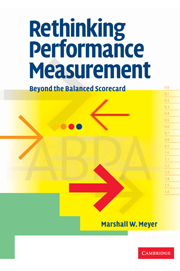5 - Learning from ABPA
Published online by Cambridge University Press: 14 May 2010
Summary
This chapter is about using ABPA. ABPA can help firms and their people learn about the drivers of bottom-line results. Once the learning process initiated by ABPA is in place, however, fairly simple bottom-line measures can be used to appraise and compensate people's performance. Thus, under ABPA, the measures used to improve performance and the measures used to appraise and compensate people's contributions to performance will be different. In complex service firms, the former will consist of transaction-by-transaction cost and profitability measures, whereas the latter will consist of bottom-line measures of customer profitability. What is significant about ABPA is that it yields both the fine-grained cost and profitability measures needed to improve performance and bottom-line measures that can be cascaded further into the organization than conventional financial measures.
There are many potential drivers of any firm's bottom-line performance. Fine-grained measurement is needed to quantify the impact of these potential drivers on financial performance, to identify the most critical drivers, and to move these drivers in a direction that promotes profitability. ABPA is well suited for these purposes because it attaches cost and profitability estimates to the activities and transactions performed by the firm. At the same time, measures that are simpler and coarser than those provided by ABPA are needed to appraise and compensate people's performance. Whether performance is appraised relative to peers or against a fixed target, the compensation decisions that ultimately result are one-dimensional. People are ranked, and some are paid more than others.
- Type
- Chapter
- Information
- Rethinking Performance MeasurementBeyond the Balanced Scorecard, pp. 145 - 167Publisher: Cambridge University PressPrint publication year: 2003



